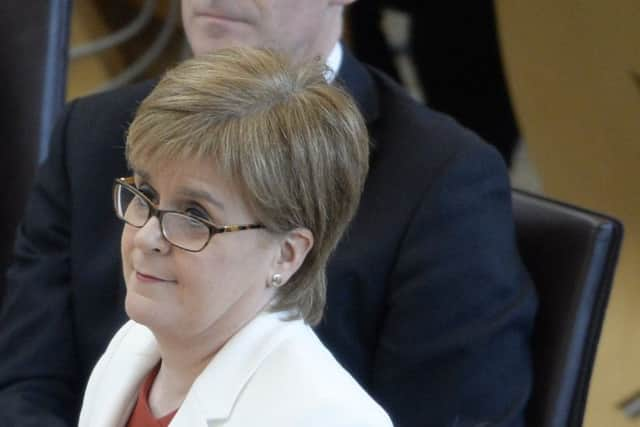Brexit vote '˜hasn't boosted independence support'
Nicola Sturgeon’s hope that EU withdrawal would increase support for breaking up the UK has failed to materialise, according to the latest chapter of the British Social Attitudes Survey.
The report by Professor Sir John Curtice and Ian Montague for the National Centre for Social Research also found that the SNP suffered a significant loss of support from Eurosceptics in last year’s snap election.
Advertisement
Hide AdAdvertisement
Hide AdThe findings will come as a blow to Ms Sturgeon on the eve of the SNP’s conference in Aberdeen, which will today see the First Minister attempt to step up her campaign for independence.


The survey based on interviews with 1,234 adults in Scotland, showed that support for the SNP dropped 15 per amongst those who were classified as Eurosceptics.
When compared with the 2015 General Election, support for the Nationalists amongst Eurosceptics fell from 51 per cent to 36 per cent when it came to the snap election that saw the SNP lose one third of its seats – falling from 54 to 34 MPs.
The Conservatives, however, benefited from an increase in support from Eurosceptics, increasing their support from voters in that category from 14 per cent in 2015 to 28 per cent last year.
The authors placed voters into two camps based on their responses to the survey questions on the EU. 37 per cent of Scots are Europhiles, who think Britain should retain or enhance its relationship with the EU. 58 per cent were defined as Eurosceptics, who would like Britain to leave the EU or to reduce its powers.
In contrast to the dwindling support from Eurosceptics, the SNP’s support from Europhiles held up only slipping slightly from 49 per cent in 2015 to 47 per cent in 2017.
The report’s authors said that Brexit had created a “new line of division” in Scotland’s constitutional debate.
When it came to support for Scottish independence, the data showed that 45 per cent wanted to split from the rest of the UK, the same percentage recorded in the 2014 referendum and a slight fall from the 46 per cent experienced in 2016.
Advertisement
Hide AdAdvertisement
Hide Ad46 per cent said the Scottish Parliament should make all decisions for Scotland, compared with 51 per cent in 2015.
More encouragingly for Ms Sturgeon, the British Social Attitudes Survey found an increase in the proportion of people who believe the economy would benefit from Scotland leaving the UK.
It showed that 41 per cent of Scots now believe the economy would be improved by independence compared with 26 per cent of people in 2014.
The data also revealed 49 per cent of Scots think the country’s voice would be made stronger in the world, compared with 33 per cent of Scots in 2014.
Support for independence has risen amongst those who categorise themselves as Europhiles. I
n 2015 the level of support for independence among Europhiles stood at 39 per cent, a figure similar to the 41 per cent support received by Eurosceptics. Now, however, support for independence is higher among Europhiles (56 per cent) than among Eurosceptics (40 per cent).
Professor Curtice, Senior Research Fellow at the National Centre for Social Research, said: “Nicola Sturgeon anticipated that Brexit would increase support for independence. Instead, Brexit has made both independence and the SNP relatively less popular among those Scots who are not very enthusiastic about the EU, even if they did vote to Remain.”
Last night the Scottish Conservatives claimed the survey showed that voters did not want the SNP to use Brexit to campaign for independence.
Advertisement
Hide AdAdvertisement
Hide AdScottish Conservative constitution spokesman Adam Tomkins said: “Nicola Sturgeon judged the Scottish response to Brexit terribly, and paid the price at the subsequent General Election, in which the SNP lost half a million votes and 40 per cent of its seat in the House of Commons.
“She should use her conference this weekend to change direction and to pledge to make Brexit work for Scotland.”
But SNP Business Convener Derek Mackay argued that growing proportion of people who believed independence would help the economy showed his party were “winning the economic arguments about Scotland’s future.”
As Labour and the Tories are blinkered by negativity and the chaos of Brexit – the SNP is focused on hope and ambition for Scotland.